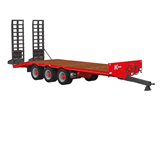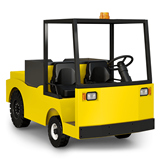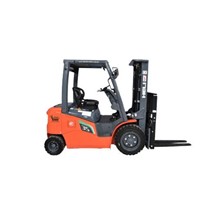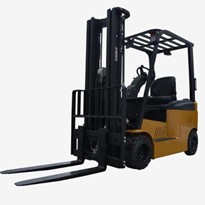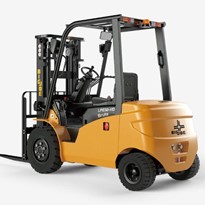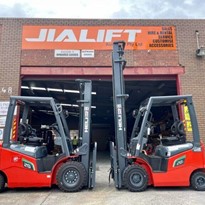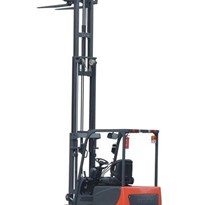While traditional LPG and diesel-powered forklifts remain as effective as ever, battery-electric forklifts are becoming increasingly popular as energy-efficient and low-emissions alternatives. In general, electric forklifts use a lead-acid battery (which will be the focus of the following guide), though nickel-iron and lithium-ion batteries are also in use.
As with its internal combustion counterparts, battery-powered forklifts require regular servicing and maintenance to stay in good working order. For safety and efficiency, it’s important to ensure that the forklift battery is properly charged, routinely serviced and regularly inspected. With proper care, forklift batteries can last up to five years (or around 1500 charge cycles).
Eventually, though, all batteries will need replacing no matter how well they’re looked after. Electric forklift battery replacement and maintenance is a specialised job, but there are many ways to identify when your battery needs to be swapped out.
If you’re running an electric forklift and worried that your battery’s days are numbered, there are a few key signs to look out for:
SIGNS THAT YOUR FORKLIFT’S BATTERY NEEDS REPLACEMENT
SULFATED BATTERIES
Sulfation is a chemical process that causes a build-up of lead sulphate crystals on the cells of a battery. This process naturally occurs to some degree in normal lead-acid batteries, but a large amount of sulfation can cause longer charging times, depleted cranking power and shorter overall battery life. Small amounts of sulfation will break down when a battery charges, but comprehensive sulfation will not, requiring the battery to be replaced.
Improper charging (prolonged low charge or not fully charging the battery) or a lack of water in the battery’s catalyst solution can cause sulfation. Sulfation can be diagnosed visually (a grey or grimy appearance is typical) or more precisely with a multimeter.
SHORTENED RUNNING TIME
Forklift batteries should, on average, last for 1500 charging cycles. If a battery’s charge quickly runs down long before the expected end of its life, there’s a good chance the battery needs to be replaced.
A battery that fails to hold its charge can be caused by overly-frequent charging such as ‘topping up’ a battery’s charge before it needs it.
DIM DISPLAYS AND LOWERED POWER OUTPUT
An overall lack of power in a forklift (often seen in dull displays) is another sign that a battery may need replacing. Causes like sulfation will generally indicate that replacement is necessary, though poor terminal connections and other contaminants may be fixed or cleaned without replacement.
CORRODED AREAS SURROUNDING THE BATTERY
If a battery is poorly maintained or otherwise subjected to stress, there is a risk of corrosion. Corrosion of battery terminals can reduce the effectiveness of charging and eventually lead to the battery needing to be replaced. Corroded terminals can be repaired by a battery manufacturer, though either replacement or repair can be prevented with a schedule of regular forklift battery maintenance.
SPILLED ACID/ DAMAGED BATTERY HOUSING
Acid leaking from a battery is never a good sign. The presence of battery acid can indicate severe battery damage and pose health and safety risks. If you notice acid collecting on the outside of the battery, it’s best to proceed with caution and use the correct PPE. Though repairs can be made to damaged batteries, they need to be carried out by professionals. In general, if you see acid on the housing, it’s a sign that the battery needs replacing.
RISKS OF USING A DAMAGED BATTERY
Using a damaged battery can risk more than losing power to your forklift. Batteries – particularly the common lead-acid type – contain dangerous and corrosive chemicals such as sulfuric acid produced hydrogen gas when charging, which can cause physical injury. Fires can also be a hazard associated with the use of damaged batteries.
When inspecting, repairing, or replacing a damaged battery, it’s important to wear the correct PPE. This generally includes rubber gloves and an apron, goggles or a face shield, and protective footwear. It’s also advisable to be in close proximity to a first aid kit and an eyewash station.
As with all potentially hazardous maintenance, enlisting the help of trained professionals like the Waverley Forklift team is the safest and most effective option for service and repair.
BATTERY CARE: WHAT YOU SHOULD DO TO KEEP YOUR FORKLIFT BATTERY HEALTHY?
Correctly following forklift battery charging instructions and understanding battery health can significantly extend the life of a battery. If you want to operate an electric forklift reliably, safely, and cost-effectively, it pays to understand how to keep your battery in good health.
WASHING YOUR BATTERY
A build-up of corrosion on a battery can cause inefficient charging and battery damage. In many cases, if attended to as part of regular maintenance, corrosion can be cleaned before the damage becomes severe. Washing is generally done with an acid neutraliser and a cleaning cloth.
As mentioned, chemicals such as sulfuric acid can pose serious health and environmental risks, so it’s important to use PPE and dispose of chemicals and cleaning agents thoughtfully.
EQUALISING AND OVERCHARGING
Equalisation is the process of deliberately overcharging a lead-acid battery. Overcharging is the process of intentionally applying a higher than usual voltage charge to a battery. Doing so can break down sulfation on battery cells, and regular, scheduled overcharging can help prolong the life of a battery.
MONITOR WATER LEVELS
Lead-acid batteries contain a liquid component called the electrolyte – a mixture of sulphuric acid and water. When the battery heats up, the water evaporates, leaving a low level of the electrolyte with a high percentage of sulphuric acid. When the electrolyte is low, the battery risks sulfation. It’s advisable to regularly top up the electrolyte with distilled water to keep the battery operating effectively.
NEED YOUR BATTERY CHANGED? ENQUIRE ABOUT REPAIRS TODAY!
Battery-electric forklifts are a fantastic alternative to traditional combustion-engine styles. As with all machinery, they require regular attention and care to stay in top shape. At Waverley Forklifts, our fully qualified technicians can provide regular repairs and services to keep your forklift battery in good health, and can assist with changing your battery when needed.


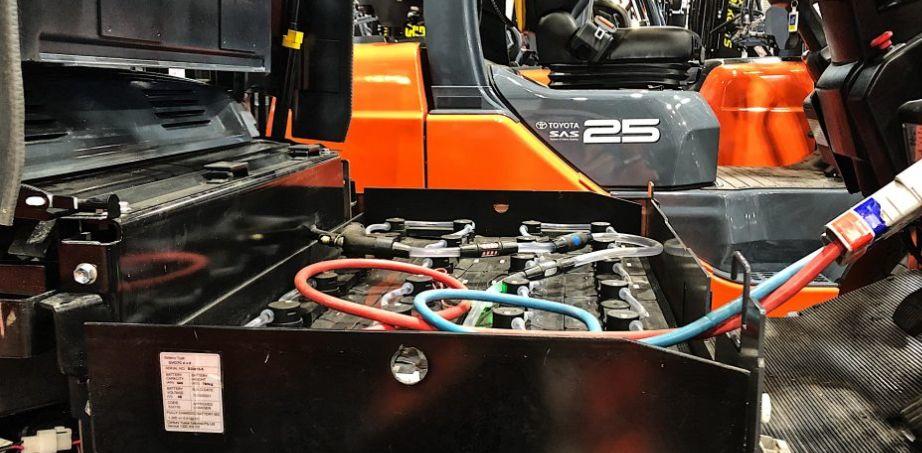





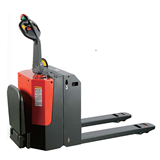

-160x160-state_article-rel-cat.png)







